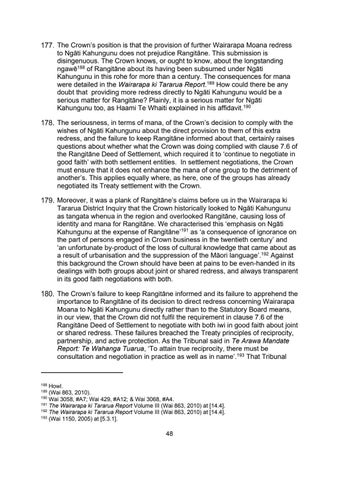177. The Crown’s position is that the provision of further Wairarapa Moana redress to Ngāti Kahungunu does not prejudice Rangitāne. This submission is disingenuous. The Crown knows, or ought to know, about the longstanding ngawē188 of Rangitāne about its having been subsumed under Ngāti Kahungunu in this rohe for more than a century. The consequences for mana were detailed in the Wairarapa ki Tararua Report.189 How could there be any doubt that providing more redress directly to Ngāti Kahungunu would be a serious matter for Rangitāne? Plainly, it is a serious matter for Ngāti Kahungunu too, as Haami Te Whaiti explained in his affidavit.190 178. The seriousness, in terms of mana, of the Crown’s decision to comply with the wishes of Ngāti Kahungunu about the direct provision to them of this extra redress, and the failure to keep Rangitāne informed about that, certainly raises questions about whether what the Crown was doing complied with clause 7.6 of the Rangitāne Deed of Settlement, which required it to ‘continue to negotiate in good faith’ with both settlement entities. In settlement negotiations, the Crown must ensure that it does not enhance the mana of one group to the detriment of another’s. This applies equally where, as here, one of the groups has already negotiated its Treaty settlement with the Crown. 179. Moreover, it was a plank of Rangitāne’s claims before us in the Wairarapa ki Tararua District Inquiry that the Crown historically looked to Ngāti Kahungunu as tangata whenua in the region and overlooked Rangitāne, causing loss of identity and mana for Rangitāne. We characterised this ‘emphasis on Ngāti Kahungunu at the expense of Rangitāne’191 as ‘a consequence of ignorance on the part of persons engaged in Crown business in the twentieth century’ and ‘an unfortunate by-product of the loss of cultural knowledge that came about as a result of urbanisation and the suppression of the Māori language’.192 Against this background the Crown should have been at pains to be even-handed in its dealings with both groups about joint or shared redress, and always transparent in its good faith negotiations with both. 180. The Crown’s failure to keep Rangitāne informed and its failure to apprehend the importance to Rangitāne of its decision to direct redress concerning Wairarapa Moana to Ngāti Kahungunu directly rather than to the Statutory Board means, in our view, that the Crown did not fulfil the requirement in clause 7.6 of the Rangitāne Deed of Settlement to negotiate with both iwi in good faith about joint or shared redress. These failures breached the Treaty principles of reciprocity, partnership, and active protection. As the Tribunal said in Te Arawa Mandate Report: Te Wahanga Tuarua, ‘To attain true reciprocity, there must be consultation and negotiation in practice as well as in name’.193 That Tribunal
188
Howl. (Wai 863, 2010). 190 Wai 3058, #A7; Wai 429, #A12; & Wai 3068, #A4. 191 The Wairarapa ki Tararua Report Volume III (Wai 863, 2010) at [14.4]. 192 The Wairarapa ki Tararua Report Volume III (Wai 863, 2010) at [14.4]. 193 (Wai 1150, 2005) at [5.3.1]. 189
48



